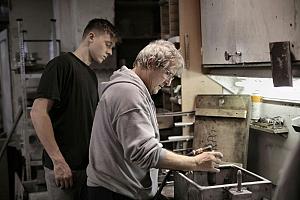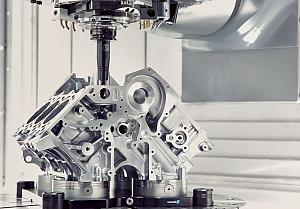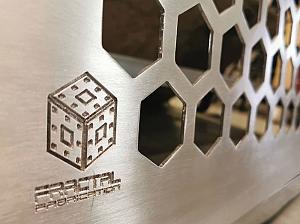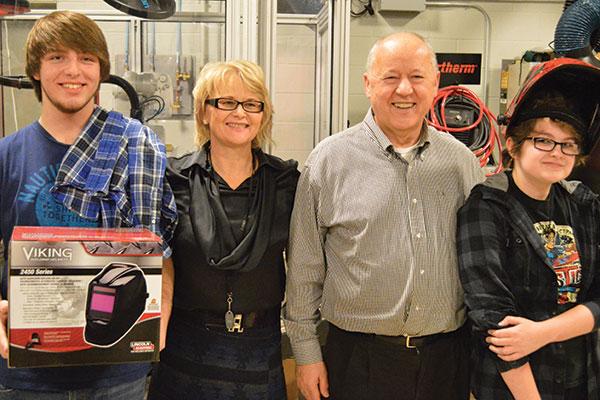- FMA
- The Fabricator
- FABTECH
- Canadian Metalworking
Giving Back
CWA Foundation finds and assists welding students from diverse backgrounds
- By Sue Roberts
- March 6, 2015
- Article
- Made In Canada
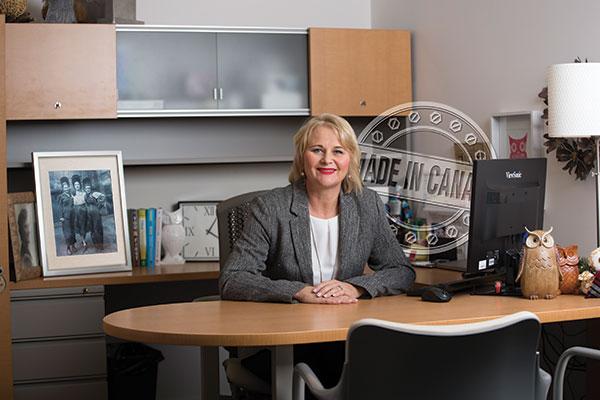
Deborah A. Mates, executive director of the Canadian Welding Association (CWA) Foundation, is inspired by a photo of three female welders. While still in her teens, her mother (on the left in the photo displayed on her office credenza) and her colleagues welded gun barrels during World War II. Photo by Jon Evans Photography.
Most Canadians give little—if any—thought to the integrity of the welds and joins that hold their world together. The metal bonds in cars, bridges, medical components, appliances, and innumerable things encountered daily are simply expected to perform properly and safely.
And that’s OK. Adherence to CSA welding standards, and the training of engineers, manufacturers, welders, and maintenance personnel involved in welding technology, has been under the watchful eye of the Canadian Welding Bureau (CWB) since 1947. The CWB ensures that each welding project is completed and overseen by certified and accredited professionals and organizations. So most Canadians can continue on without giving a thought to the metal connections in their lives.
Over 54,000 Canadians, however— manufacturers, engineers, inspectors, welders, and educators—do think about the importance of good welds and joins for today and into the future. They have united to promote and support the industry as members of the Canadian Welding Association (CWA), the not-for-profit division of the CWB Group.
The CWA Foundation was established two years ago in response to the shortage of welding professionals and lack of young people entering the trades. Wholly funded by CWB Group, the foundation has two goals: increase welding safety awareness so those entering the profession learn and work in safe environments and create a flow of qualified tradespeople to step into positions vacated by retiring welders.
Deborah A. Mates, certified fund raising executive and executive director of the foundation, took time away from crisscrossing the country to present awards and encourage award applicants to talk about the organization and how the programs have quickly gained traction.
CIM: What sparked the establishment of the CWA Foundation?
Mates: The CWB Group has always supported students through various missions but mainly through a scholarship program set up many years ago. In 2013 the CWB Group’s board of directors felt that they wanted to do more to help students across the country so they set up the CWA Foundation. Over the next 10 to 15 years there will be a large number of tradespeople retiring, and CWB Group wanted to actively contribute to the recruitment and development of welders to fill that gap.
CIM: Where will the foundation find future welders?
Mates: From speaking with educators, we realized that to interest traditional students, those attending school now, we would have to introduce them to welding at the elementary school level as well as help educators, counselors, and parents understand that there are really good career opportunities in welding. That spurred a segment of our programs aimed at younger students.
We also reach out to find and assist future welders from demographics where barriers to gaining a trade education can be huge, like women who are unemployed or underemployed, at-risk youth, and our indigenous population.
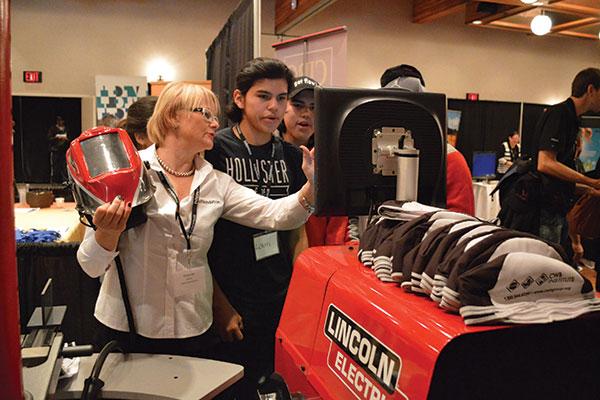
CWA Foundation Executive Director Deborah Mates shows a student how to use the welding simulator during an Indspire event in Thunder Bay, Ont.
CIM: How are you introducing welding to students?
Mates: We are seeking to educate guidance counselors, teachers, and students beginning in grades 7 and 8. At every opportunity we go into schools with our welding simulator and participate in career fairs. We participate in all provincial Skills Canada competitions. The simulator is a great teaching tool that lets students try welding in a safe environment. Being physically present at these events puts us in front of students and teachers to talk about welding careers.
At the secondary school level we provide scholarships to students in grade 12 who are going on to post secondary training in welding technologies. This program, launched just this year, had upwards of 30 applications. The program had an allotment of $50,000 for those students this year, and that funding is expected to double next year.
Moving on to post secondary—we have a strong scholarship program for students in one-, two-, or threeyear programs or apprenticeships. We even have student applicants at the PhD level. We work closely with colleges and universities to identify applicants who are interested in advancing their welding career education. This year we presented 32 awards of $2,500 each to our advanced students. Next year we hope to see the number of applications for post secondary awards double. Oftentimes if students didn’t receive additional funds they wouldn’t be able to continue their education.
CIM: Do you educate the educators?
Mates: Yes. We have learned that oftentimes a welding teacher’s background is not specific in welding. They may be teaching welding but their education is in auto body or another trade and so they come to us for help. We assist with curriculum development and help provide better teaching tools. We developed a two day Train the Trainer Workshop, available for secondary school boards, that combines theory and practical knowledge. The pilot program held in 2014 drew 30 post secondary teachers. In 2015 the foundation hopes to launch this program across all provinces.
In addition, our newly developed materials repository set to launch in April to educators accepts donations of equipment, supplies, and materials from industry and suppliers. This allows industry to support our educators through the donation of anything from scrap metal to safety equipment to welding machines—better-prepared teachers and classrooms will produce better-prepared students.
CIM: What other groups are you reaching and assisting and how?
Mates: We understand that other organizations are already offering assistance to certain demographic groups and they have programs in place to help identify good candidates for welding education assistance. Working with these organizations helps to propel our programs forward faster than we could alone.
For example, in all provinces we are finding organizations that focus specially on helping women enter the trades. So we are working with those organizations to set up what we call barrier or adversity funds. These funds will help women who do not have the resources to pursue a welding education on their own. They may be for things like child care costs while attending school, purchasing protective work attire, or assisting with transportation costs. We provide the funds, and the agencies disperse them on an as-needed basis.
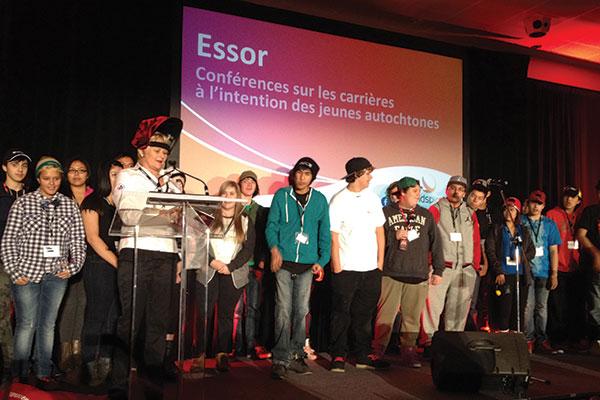
Welding students gathered on stage while CWA Foundation Executive Director Deborah Mates talked about career options in the welding profession during an Indspire event in Thunder Bay, Ont.
Working through Indspire, a national charitable organization, we distribute scholarships and bursaries to indigenous youth interested in welding. Six students applied to this program in November and will receive funds to assist in their postsecondary education in welding. There are great opportunities for this population to become involved in the industry, and we have made a five-year commitment to Indspire to support these young people.
CIM: What’s new for this year?
Mates: We are planning to launch a series of summer camps for at-risk youth between 12 and 15 years old across many provinces. The schools will help identify students who would benefit from this opportunity, and will work with various social service organizations within their communities that might be able to recommend participants.
During two week long pilot camps last year it was incredible to see the students’ change in enthusiasm for welding and school. We find that when a student can relate education, like math or English skills, to something enjoyed that they begin to work to understand it. They actually change their minds about dropping out of school and want to learn essential skills.
CIM: What makes the foundation programs different from others?
Mates: My goal to meet students and educators face-to-face and foster relationships makes us different. I want to know who they are and to help them in ways other than just financially. We are looking at creating a mentoring program to be coordinated through our CWA chapters across the country. So if students are struggling with math, socially, or just having trouble getting through school, they have someone to help.
When you meet the individuals and learn about their needs, you can talk about the award opportunities and convince them to apply. A lot of times a student won’t take the time to apply because he or she is afraid they won’t be successful. The one-on-one environment we are committed to really removes these barriers.
And we look at more than grades. A lot of scholarships or bursaries programs are strictly academic or financial need-based. We like our recipients to be doing well in school, but we also look for passion and interest— youth who have welded cars with their dads, or enjoyed welding on a farm and want to follow that dream.
We’ve found that it’s one thing to post a scholarship or award offer to a website and a very different thing to meet the students, convince them to apply, and provide encouragement. I want to know who the students are, not just write checks and send them in the mail.
CIM: As the only foundation employee, how do you keep all the programs growing?
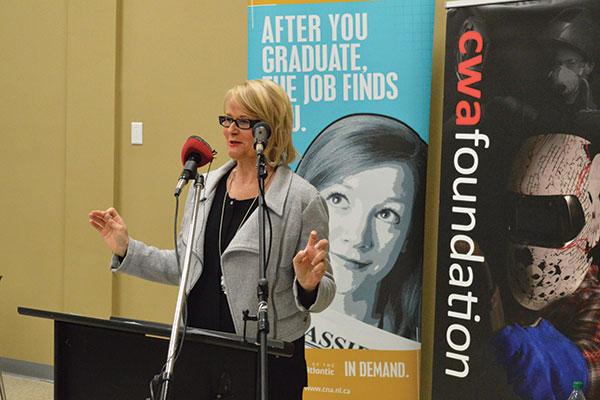
CWA Foundation Executive Director Deborah Mates spoke during an awards ceremony at the College of the North Atlantic Burin Campus. Nine welding engineering technician students received $2,500 each.
Mates: Many people across the country are involved as volunteers. CWB Group staff and the many CWA chapter volunteers provide resources. We also have students and teachers who participate.
People are inspired to be involved. They love to talk about welding and the great careers they have and to encourage others to pursue the trade.
CIM: How can industry be more involved?
Mates: We would be grateful for industry to become involved. We are hoping companies will want to add to the scholarships funded by the foundation by contributing to named awards. The foundation would identify the student, and the manufacturer or supplier would contribute the funding. Most companies have a philanthropic focus of some kind, and having the opportunity to align their dollars with a program related to the future of the industry makes sense. In addition, our materials repository is a great program to assist secondary schools, and we need industry to support this by donating what they are able.
CIM: Who steers the foundation?
Mates: Governance of the foundation is provided by an independent board of directors. Members were invited to participate based on their abilities to advise and help advance the foundation’s mandates. Iain McNab, dean, faculty of applied science and technology at Sheridan College in Oakville, Ont., is contributing his expertise in education. Shaun Thorson, CEO of Skills Canada, is contributing with a breadth of knowledge on what is happening across the country in all the trades, including welding. Ken Aucoin from Indspire guides our focus on promoting welding to the aboriginal youth and working with that segment of our population. CWB Group Board Chairman John Marinucci and CWB Group President and CEO Doug Luciani represent our funding organization.
CIM: How long until the industry actually reaps benefits from the programs?
Mates: Now. Some of our recipients are already in the workforce as apprentices and through part-time employment. Many of them have jobs lined up immediately following school and are using our awards to increase their skills or to reduce debt incurred from their education.
The industry will see a continuous flow of CWA Foundation-supported welders entering the workforce because we identify and support people involved in or seeking various levels of welding education. The foundation is already having a significant impact on reaching those individuals and helping them succeed.
subscribe now


Keep up to date with the latest news, events, and technology for all things metal from our pair of monthly magazines written specifically for Canadian manufacturers!
Start Your Free Subscription- Trending Articles
- Industry Events
ZEISS Quality Innovation Days 2024
- April 15 - 19, 2024
Tube 2024
- April 15 - 19, 2024
- Düsseldorf, Germany
CTMA Economic Uncertainty: Helping You Navigate Windsor Seminar
- April 30, 2024
- Windsor, ON Canada
MME Winnipeg
- April 30, 2024
- Winnipeg, ON Canada
CTMA Economic Uncertainty: Helping You Navigate Kitchener Seminar
- May 2, 2024
- Kitchener, ON Canada




